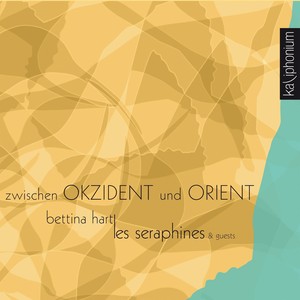
Zwischen Okzident Und Orient
- 流派:Classical 古典
- 语种:德语
- 发行时间:2013-11-15
- 类型:录音室专辑
- 歌曲
- 时长
简介
How does the alchemy of two or more voices emerge beyond the accessible polarity? Can one find a togetherness where everyone is equally present? Where one needs nevermore search externally for that part which will make a person whole, but rather is willing to allow oneself to be made whole through genuine dedication? The fundamentals of a composition, which can be so aimed at featuring each musician in such a way as to achieve the highest possible effect of the music. Where can one find music which connects the Above with the Below? I have been yearning to compose such a "World Music" where Heaven and Earth are locked together in a neverending kiss. Music, with its essential truth and wholeness, has always fascinated Bettina Hartl; in particular a very special part of our occidental music history, early Italian baroque. Here she heard optimism, expressed with reality and authenticity in an extraordinary complexity of uncountable modulations, balanced voices and unstrained virtuosity, coupled with singular dissonances. Later she found her way to Sufi music, to the eternal laws of the cosmos, reflected in the orbits of stars and planets, the rhythms of nature, the breathing in and out of music, the complexity of modulations as well as the stillness of a single tone; an all-in-one experience. In her search for these two cultural foundations Hartl explores connections and contrasts, which allow conjecture over their similar roots. She merges her own baroque music with new arrangements of one Claudio Monteverdi, contra posed with Indian and Persian Sufi music, reworking her compositions and also introducing elements of Celtic music. With compositions boasting a diversity of forms and styles, Hartl has written love songs, elfin like chants, music reminding us of shamans plus baroque Ciacconas and film music, all of which involve and relate to her “essence”. She always allows space for improvisation, combining rigorous format with experiment. Alongside classical instrumentation she introduces unusual instruments which are seldom heard together. To fit with the energy of the composition Bettina Hartl also uses different languages and fantasy verse. In connecting “East and West” she sets herself before a background of conscious communication with one another and a holistic approach to world music. Wishing to experiment with her own music without any limits and research “energetic” improvisation Bettina Hartl formed a new Ensemble in 2010. The result was ensemble circa fünf which varied in both its form and choice of music. In 2012 the name changed to Les Seraphines and, since then, five musicians have crystallised into the ensemble’s core, playing; bandoneon, piano, cello, violin, clarinette, bass clarinet, chest organ, organ and chanting. The quintet also contrasts pieces with the Celtic harp and Indian tanpura and can expand to include other strings and a choir as required. Les Seraphines combine scored music with free improvisation and they sing in Persian, Sanskrit, Gaelic, Latin, Italian, Spanish, English and in fantasy verse. In fusing western and eastern musical influences, the musicians experiment with their different modes, so early baroque’s rich diversity of modulation, complex linear harmonics, majors and minors find solace in the circular, trance-like rhythms concentrating on the obbligato. Les Seraphines recapture the freedom of those earlier epochs, enrich them with their own virtuosity and are inspired by the great improvisation the two genres allow.

